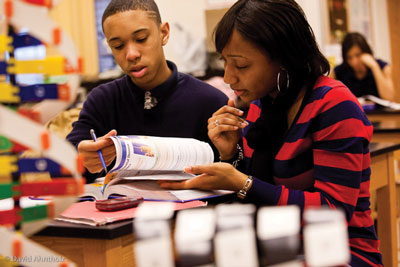Loyola University Chicago Strtich School of Medicine
Peer Tutoring Program

Greg Gale
Program Coordinator
Tutoring Services
Peer Tutoring
- The Teaching and Learning Center coordinates a peer tutoring program staffed by select graduate students, medical students, residents and fellows.
- Tutoring services are free of charge to Stritch School of Medicine students
Why students may I need a tutor?
- Limited or no prior knowledge of the course material
- Non-science undergraduate major
- Some difficulty understanding how knowledge is structured in a particular subject area
- Difficulty identifying relationships between major concepts
- Sense of being lost in the details
- Problems imposing meaningfuil organization of the material
Tutor Position Description
Peer tutors provide individual and small group tutoring sessions in subjects the tutor has obtained a grade of high pass or honors. The tutor facilitates learning as a guide and coach to assist the student to become a successful, independent learner. The purpose of tutoring is to increase and enhance mastery of concepts or applications of a specific course of study.Peer tutors integrate effective study and learning startegies to maximize the tutee's potential for academic progress. Peer tutors can also refer students to other appropriate medical school resources as needed.
Responsibilities
- Tutor students in specific course material and integrate study and learnign strategies to promote independent learning.
- Meet with the instructor of the course you are tutoring and discuss your role as a tutor and obtain any information that will assist you to effectively tutor.
- Complete and submit Tutor Evaluation forms.
- Make appropriate referrals to other resources and inform the Peer Tutor Coordinator of any referral.
Position Requirements
A Peer Tutor must demonstate an ability to quickly establish rapport and communicate well wtih students. A Peer Tutor must have earned a high pass or honors in the course they wish to tutor.
- Tutors are to provide course tutoring to first and second year SSOM students, and to students who are remediating a course exam, or retaking a USMLE Step exam.
- Tutors may meet with students on a one to one basis or with a small or large group, depending on the needs of the students.
- Tutors must complete the tutor feedback form and reutrn to the Program coordinator when requested.
Supervision
- Tutors are supervised by the Program Coordinator of the Teaching & Learning Center. The Program Coordinator may meet individually with tutors as needed and will conduct in-service training as needed.
Remuneration
- Most tutors volunteer their time. "The literature also shows that the gains for tutors often outdistance those of the students receiving help.This results from reworking what they know in order to make it understandable to their tutees."
- Tutors who wish to be paid will be required to fill out the necessary paper work and be processed through Human Resources, which will include a mandatory physical. Each tutor will be responsible for submitting their hours to the Program Coordinator so payroll can be processed.
- Tutors are paid $10.00 an hour for individual tutoring and $15.00 for small/large group facilitation.
Tutoring Tips 
- Treat your tutees as equals
- Don't worry about mistakes - they provide the best opportunity for teaching and learning
- Don't be critical of your tutees
- Recognize your differences and commonalities, a vital step to building a tutoring relationship
- Be supportive of tutees' efforts as well as their accomplishments
- Be hopeful
- Make learning active, fun, visual and hands-on
- Keep your eyes on the significance of your effort in your tutees' lives.
- Be willing to share your experience when you think it's appropriate
- Don't make empty promisses
- Don't forget how important you are - your tutee depends on you
- Be on time
- Use differences between you an your tutee to open honest conversations
- Forgive your errors and those of your tutee - they were unintentional
- Be opne minded
- Be empathetic toward your students and thier experiences
- Be observant and pay attention to what your tutees enjoy and how they learn
- Incorporate tutee interests into your activities and assignments
- Be creative
- Set educated goals and strive for them
- Be repectful
The Tutor and the Learner 
- Tutoring sessions must be learner centered. Your primary focus should be on the needs of the tuttees.
- Be supportive, encouraging and demanding.
- You are their guide to clarify and to promote involvement with the course content.
- You should encourage them to conceptualize their understanding of basic science knowledge on whiteboards, and practice integration and application of their knowledge using test questions.
- Under no circumsatnces be led into re-lecturing the content or simply answering questions.
- Insist on and plan for learner participation in every lesson.
Learners will vary greatly in their relationship to you. Some will trust you with personal confidences; others will simply come to the sessions and leave without comment. Some will perceive you as another instructor; others will see you as a freind. Be sensitive to these individual perseptions. Strive for a good blend of leadership and friendship.





